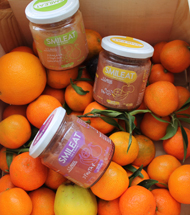Rocío de la Iglesia (E-MENU 09, PhD 14): the core topic of Smileat's success
The postgraduate from School of Pharmacy and Nutrition is co-founder of business dedicated to healthy and organic baby food.

PHOTO: Courtesy

PHOTO: Courtesy
Rocío de la Iglesia (Master's Degree European Food, Nutrition and Metabolism 09 and PhD in Nutrition from the University of Navarra) is one of the promoters of Smileat, a business dedicated to the development of organic products for children. Since its beginnings, in 2014, they have managed to place their products in more than 1,800 national points of sale and make the leap to the international market. All this without losing sight of the fact that their differential point lies in healthy, tasty, wholesome and organic food.
- How did the idea of creating Smileat come about?
Smileat was born out of our own concerns about food, due to problems that had arisen in our environment with different diseases. At that time, in addition, many people around us started having children. They told us that the market did not offer baby food products with healthy, top-quality ingredients, so we focused on that niche market.
- As a dietitian-nutritionist, what is your contribution to project?
In my case, I joined the team together with Alberto Jiménez (Co-CEO) and Javier Quintana (Co-CEO), also as co-founder and manager of product. I was in charge, therefore, of everything related to nutrition: design and product formulation, calculation of nutritional values, compliance with food legislation, contact with factory to control that the development of products is made under quality standards, as well as social work average related to food: giving talks, publishing posts on children's food, etc..
However, when you set up a business from scratch you have to do everything, and that's what I like the most about this experience, I have learned a lot!
- How do you value the training received in the School when it comes to getting involved in projects like this? Do you think that in the general training in Spain there should be more weight in subjects or in learning skills for entrepreneurship?
I value my training enormously, as it was what made it possible for me to be part of the founding team of Smileat. My experience at the University of Navarra also helped me to deepen and broaden my knowledge in subject nutrition and research.
Being researcher makes you open-minded and innovative and always up to date with the latest findings. Both skills have helped me a lot when designing Smileat products. Also, the fact of doing the degree program in Madrid and the Master's Degree and the doctorate in Pamplona made me expand my contacts, what they call "networking", so important in the world of entrepreneurship.
Leaning on the people around you is essential. In the end, everyone can give you something. However, I do believe that training should have a specific section on entrepreneurship. In fact, since the crisis, many young Spaniards have opted for this path, and free courses and grants for young entrepreneurs are becoming more and more common in our country.
- Do you consider that healthy eating is more fashionable today than ever?
I believe that people are increasingly concerned about their health, and food represents a very relevant area to maintain a healthy state. However, at the same time there are many opportunists who try to take advantage of people's interest in food to sell products and services that are not based on science.
Fortunately, the profession of dietitian-nutritionist is becoming more and more known and taken into account, just as the legislation on the food information that the consumer should receive is being defined.
- If your products contain no added sugar or salt, no thickeners or concentrates, why does the rest of the industry use these compounds?
I think the rest of the industry uses them because they make the production process easier, lower the cost and get children "hooked" on their products.
Thickeners -such as starch- help to achieve the desired texture and increase the production Issue by absorbing water. This means that you can offer a cheaper product, even if it provides less vitamins and minerals than if you were to achieve that texture by adding everyday ingredients, such as potato or carrot.
The same is true of juices from concentrate. These are of lower quality because they are made from the juice of a fruit, but the water is extracted from it - usually by heat (so that water-soluble vitamins or vitamins that do not resist heat are lost) - all this to facilitate their transport and storage. Finally, when they are to be used as an ingredient, water is added again.
- Do you think that the food trend should be healthier for the food companies' own responsibility?
We already know that sugar is addictive. In fact, many children who consume sugary products reject the versions that do not contain sugar.
We are targeting health-conscious parents who know the importance of not giving their children sugary products, especially when they are so young.
Salt, on the other hand, improves the palatability of the products. We do not add it because it is not recommended for children under one year old. If a parent wants to give one of our jars to a child older than one year, he/she can always add a pinch of salt.
The secret of our products is to play with their composition to achieve a pleasant taste and a suitable texture but always with the same ingredients that a parent would use at home, without the need to add sugar, concentrates or starches. This, of course, implies organoleptic tests and readjustments of the formulation, using subject first quality raw material at its optimum ripening point -for which margins have to be adjusted if we want to reach the consumer with reasonable prices-, etc. l
- What is your evaluation of Smileat's trajectory so far? What growth projects do you have in the short term?
My evaluation of Smileat is very positive. If I had been told when we started the project that we were going to be in 1,800 points of sale today -some of them as well known as Carrefour-, as well as having made the leap to internationalization; or that we were going to have more than 10,100 followers on Facebook, I would not have believed it... However, we have to keep our feet on the ground and keep moving forward step by step.
We now have many new projects. Among them, to expand the range of products aimed at children. But we want to do it right: differentiate ourselves from other brands and always offer healthy, quality products, and that takes time.
